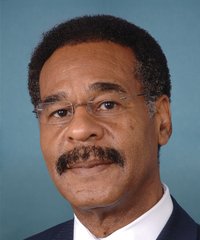
Emanuel Cleaver, II is now serving his ninth term representing Missouri's Fifth Congressional District, the home district of President Harry Truman. He is a member of the House Committee on Financial Services; Chair of the Subcommittee on Housing, Community Development, and Insurance; member of Subcommittee on Investor Protection, Entrepreneurship, and Capital Markets; member of Subcommittee on Oversight and Investigations; member of the House Committee on Homeland Security; member of the Subcommittee on Border Security, Facilitation, and Operations; and member of the Select Committee on the Modernization of Congress.
Having served for twelve years on the city council of Missouri's largest municipality, Kansas City, Cleaver was elected as the city's first African American Mayor in 1991.
Energy security is an economic, national security, environmental, and health concern that touches all Americans. The United States has less than 5% of the world’s population, but we consume nearly one quarter of the world’s produced oil. We depend on energy to light our homes and businesses, natural gas to heat them, and gasoline to power the cars and trucks that carry us to work and transport our goods. As other nations continue to develop and the global demand for energy rises, we must work to ensure reliable energy sources so our children and grandchildren can enjoy the same quality of life that we do.
Many Americans are experiencing a home-energy challenge. During peak winter and summer months, energy bills can reach up to 30 percent of a low-income household’s monthly income. Families should not have to choose between heating their homes and putting food on the table; that is why I have continually supported the Low Income Home Energy Assistance Program (LIHEAP). LIHEAP provides assistance for heating and cooling to almost 9 million households.
As early as 1859, British scientist John Tyndall discovered that carbon dioxide (CO2) can trap heat. Since Charles Keeling began measuring atmospheric CO2 in the late 1950s, scientists have accumulated a wealth of evidence documenting the increase of greenhouse gasses in the atmosphere, the rise of global average temperature and the influenace of human activities on the Earth’s climate.
I was proud to be chosen to serve on the Select Committee on Energy Independence and Global Warming. From 2007-2010, my colleagues and I held over 50 hearings on the security, economic and environmental threats posed by global warming and investigated policy options and technologies to conserve energy and reduce greenhouse gases in the atmosphere. The Committee also worked to communicate these issues directly with the American public.
Over 70 percent of electricity in the U.S. is generated from non-renewable sources, and coal is used to generate almost half of our total domestic energy. However, electricity use is expected to increase 40% over the next 20 years. With the U.S. holding less than 2 percent of the world’s oil reserves, we need to develop alternative sources of energy. We must invest in clean-energy generating technologies such as solar, wind, geothermal and hydropower as part of a long-term, ecologically sound energy strategy. Devastation wrought by the BP Deepwater Horizon oil spill should be a wake-up call for our country to re-examine our energy strategy.
As a member of the House Sustainable Energy & Environment Coalition, I will continue to advocate policies that promote clean energy technology and domestic manufacturing, develop renewable energy resources, and create green collar jobs throughout the supply chain. To learn more about the Sustainable Energy & Environment Coalition (SEEC), click here.
About 30% of the energy used in commercial and industrial buildings is used inefficiently or unnecessarily. Investing in the research and development of technologies that will curtail some of our energy demand is vital. More efficient appliances, automobiles and manufacturing processes will go a long way in reducing emissions and will aid greatly in creating a cleaner environment. That is why last Congress I introduced H.R. 627, the Home Energy Loss Prevention Act, which would require an energy audit be done within the last 5 years of a house being sold. I also support continued funding for home weatherization, through tax credits or assistance to low-income households.
Natural gas has the potential to help our nation bridge from traditional fossil fuels to cleaner, renewable sources of energy. Just one trillion cubic feet of natural gas is enough to heat 15 million homes for one year. However, we must ensure that it is produced safely and responsibly. Because the use of hydraulic fracturing is increasing, Congress must require that companies disclose the chemicals that are injected into the ground and conduct monitoring to ensure that the wells do not pollute the surrounding air or water.
Nuclear energy is a large part of our nation’s current energy supply. However, the crisis at Japan’s Fukushima nuclear power plant last year has revived concerns about the safety of nuclear power plants and the management of radioactive spent fuel produced at the plants. The construction of additional nuclear reactors in the United States could allow for greater energy independence; however, the potential consequences of such a commitment must also be considered. Safety must be paramount.
I am a firm supporter of alternative energy sources that are renewable and produced in a method that are ecologically and socially responsible. Biofuels have several potential benefits relative to our current petroleum-based fuels. The use of biofuels can reduce emissions of some pollutants relative to gasoline or diesel fuel.